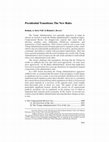Papers by Bethany Davis Noll
SSRN Electronic Journal
We are grateful for the excellent research assistance of Chelsea Anelli, Alec Dawson, Will Hughes... more We are grateful for the excellent research assistance of Chelsea Anelli, Alec Dawson, Will Hughes, Rachel Rothschild, and Pablo Rojas. We filed amicus briefs in several of the cases discussed in this Article, including in Air All. Houston v.
Razon Y Palabra, 2001
Independent media catalyze and reflect economic and political development. Over the last 15 years... more Independent media catalyze and reflect economic and political development. Over the last 15 years, policy and decision makers, humanitarian organizations, and foundations have begun to focus on the link between media and good governance, the development of ...

Yale Journal on Regulation, 2022
The Trump administration was unusually aggressive in using an obscure set of tools to undo the Ob... more The Trump administration was unusually aggressive in using an obscure set of tools to undo the Obama administration’s regulatory legacy: Congressional Review Act disapprovals, requests that courts hold in abeyance pending cases challenging Obama-era regulations, and suspensions of final regulations. These actions could be seen as part of the Trump administration norm breaking approach to regulatory policy, under which it also provided shoddy justifications for its actions, ignored statutory commands, and failed to comply with procedural requirements. There has been a general assumption that the norm-breaking was a result of the Trump administration’s lack of respect for the rule of law and that it would subside when a new administration took office.
This Article challenges this assumption with respect to the manner in which presidential transitions are conducted, showing that the Trump-era toolkit on rollbacks has now also been used aggressively—in some cases more aggressively—by the Biden administration. Actions that might have been seen as an aberration four years ago should now be regarded as integral components of the administrative state.
As a result, the nature of the presidency has changed in significant ways. A one-term president will likely not be able to implement much regulatory policy that is durable. And to do so, a president has a much shorter period during which regulations are likely to be protected from quick undoing by a successor of the opposite party, from roughly three-and-a-half years to about two years. The impact of this trend is particularly significant because, during the current era of congressional gridlock, presidents rely on regulations as the primary way in which to implement their domestic policy programs.







Uploads
Papers by Bethany Davis Noll
This Article challenges this assumption with respect to the manner in which presidential transitions are conducted, showing that the Trump-era toolkit on rollbacks has now also been used aggressively—in some cases more aggressively—by the Biden administration. Actions that might have been seen as an aberration four years ago should now be regarded as integral components of the administrative state.
As a result, the nature of the presidency has changed in significant ways. A one-term president will likely not be able to implement much regulatory policy that is durable. And to do so, a president has a much shorter period during which regulations are likely to be protected from quick undoing by a successor of the opposite party, from roughly three-and-a-half years to about two years. The impact of this trend is particularly significant because, during the current era of congressional gridlock, presidents rely on regulations as the primary way in which to implement their domestic policy programs.
This Article challenges this assumption with respect to the manner in which presidential transitions are conducted, showing that the Trump-era toolkit on rollbacks has now also been used aggressively—in some cases more aggressively—by the Biden administration. Actions that might have been seen as an aberration four years ago should now be regarded as integral components of the administrative state.
As a result, the nature of the presidency has changed in significant ways. A one-term president will likely not be able to implement much regulatory policy that is durable. And to do so, a president has a much shorter period during which regulations are likely to be protected from quick undoing by a successor of the opposite party, from roughly three-and-a-half years to about two years. The impact of this trend is particularly significant because, during the current era of congressional gridlock, presidents rely on regulations as the primary way in which to implement their domestic policy programs.